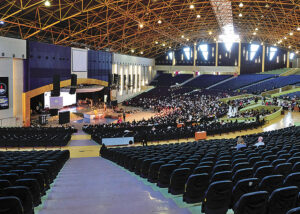The Anabaptist/Mennonite worldwide communion has come a long way since the first Mennonite World Conference some 90 years ago.
Organized by Christian Neff, a German Mennonite pastor, only 100 persons attended that first gathering in 1925 in Basel, Switzerland. Estimates of the worldwide communion numbered 516,300, according to Global Anabaptist Mennonite Encyclopedia Online. Most of the participants were from Europe.
This year, at the 15th gathering in Harrisburg, Pennsylvania, some 6,000 to 8,000 are expected to attend from 83 different countries representing 1.7 million baptized believers, including those from Brethren in Christ churches. That communion has a majority of non-white persons with some 66 percent being African, Asian or Latin American. The general secretary is César García, from Colombia, after a long line of white North American/European leaders.
The world scene in 1925 was vastly different from 2015, too. Sandwiched between two world wars, the cultural landscape stands in sharp contrast to that of today’s, albeit no less troubled. The primary concern in those early days was to “determine whether anything could be done for suffering brothers and sisters in the Soviet Union,” according to an historical account written by John A. Lapp, on the occasion of the 75th anniversary of MWC.
Today, the actors might have changed but the stage set is pretty much the same. Political unrest, except in North America, still persists in much of the world, with extreme violence still the tool of oppression by revolutionaries wanting to conquer hearts, minds and territory. Hence, many wanting to attend MWC from these war-torn countries are having difficulties getting visa clearance.
Still conscious of our place in a troubled world, the planners for this year’s event thought it best, however, to focus on something that will rise above the travails of our time, with the theme “Walking with God,” an emphasis on the “Christian walk as a journey; we have not reached our goal.” This seems in the best tradition of the event, especially since a turning point in 1972, according to Lapp, which he describes as the “most controversial conference held in Curitiba, Brazil.”
Not only was that the first MWC Assembly held outside of Europe and North America, it also, again, recalled Lapp, found itself in political struggles in America, especially with the civil rights movement,Vietnam war protests and heightened concerns over authoritarian and repressive governments in eastern Europe and Latin America, especially in Brazil where they were meeting.
“Times have changed,” C.J. Dyck said then. “One-third of the Mennonites in the world today are nonwhite. . . . If MWC is to continue as a useful instrument in the world brotherhood it must be more than an ethnic gathering to celebrate a great past. It must be a part of the mission we are being called to in the world, not just white western Mennonites. . . . Unless MWC can become an integral part of what we want to be and do in the world, it cannot have a real future.”
That set MWC on a different path, focusing more on how we express and practice our faith together, in all national/cultural settings. It has come to symbolize the lofty words of John in Rev. 5:9 describing the final gathering of “persons of every tribe and language and people and nation.”
To that end, Canadian Mennonite has asked five different writers if they would lead up to the July event with their thoughts on different aspects of the the New Testament call to faithfulness in a new order. Palmer Becker, a Mennonite Church Canada Witness worker taking the Anabaptist story to churches in Asia, Latin America and the Middle East, is the first writer of the series in this issue (see “Mennonite Christians are unique”). Also see Will Braun’s viewpoint, “Interdependency at the heart of MWC vision.”
Andrew Suderman, another Mennnonite Church Canada Witness worker, will focus on reconciliation in South Africa; Mary Schertz, professor of New Testament at Anabaptist Mennonite Biblical Seminary, will address the value of educating our leadership in the Anabaptist faith tenets; Arli Klassen, chief development officer for MWC with worldwide service experience, writes on “It Takes a (Global) Village,” and Brian Quan, a new Canadian pastor from Toronto, Ontario, approaches the subject from the “ask and it will be given” promise of Jesus in Matt 7:7.
See more about the 2015 Mennonite World Conference Assembly at www.mwc-cmm.org/pennsylvania-2015.







Leave a Reply
You must be logged in to post a comment.